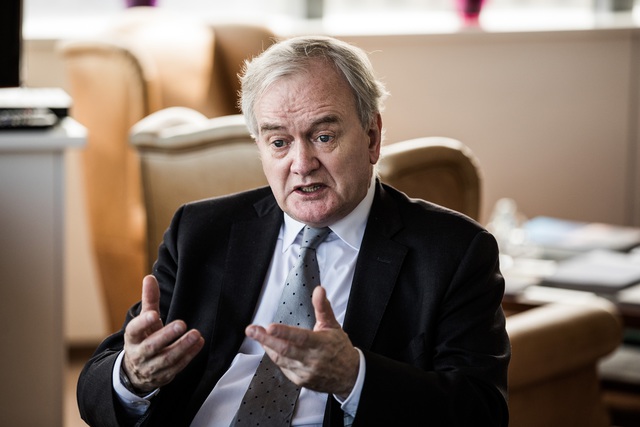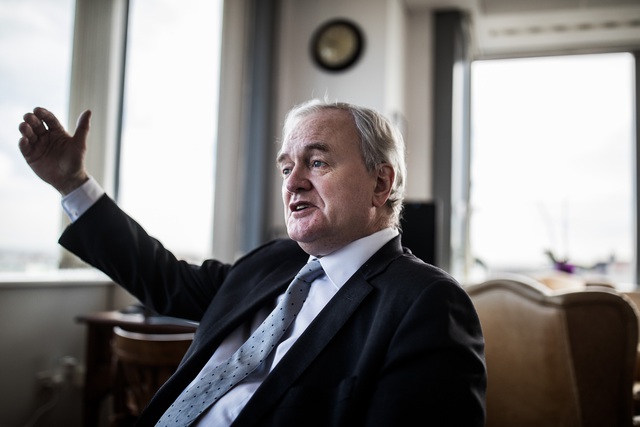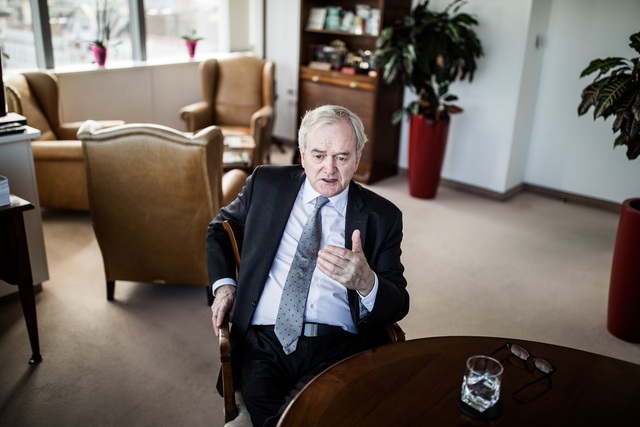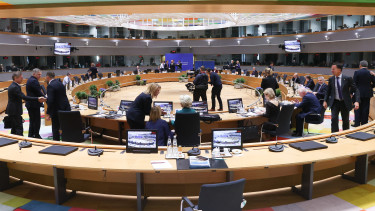Exclusive: world famous economist thinks it is not a trade war, but a game
Portfolio: Many believe that the import tariffs announced by U.S. President Donald Trump were risking a trade war. How realistic chances of that are in your view?
Willem Buiter: I hope it is not true, but I also believe that it is unlikely to be true. We are more likely to see some small trade skirmishes than a very damaging trade war. The reason is that the admittedly quite unreasonable statements made by the US administration fit into a long, sequence of often outrageous, over-the-top statements that are not and should not be interpreted as the final offer, but simply as part of a bargaining process.
There is a well-known result in game theory that says that if you are in an adversarial bargaining process and you can convince your opponent that you are irrational, then you have a huge bargaining advantage because an irrational person does not do cost-benefit analysis and cannot be deterred. If Trump is viewed as irrational, he has to be bought off, given what he wants. So I think there is an element of that. Trump co-wrote this book ‘The Art of the Deal’, and that is really a popular version of this game theoretic situation.
So, I think that there are risks associated with this strategy, things can always get out of hand and if you rattle a cage hard enough the animals inside may escape. But I am hopeful that the soup will not be eaten as hot as it is being served.
How could the global economy be impacted by these trade skirmishes?
If you have a serious trade conflict, and the 25% and 10% tariffs are really imposed across the board (Canada, Mexico, EU, Japan, China) and on a wide range of goods and services, then it will be the end of the world recovery. It is as simple as that. We have been there. We had trade wars in the 1930s and it prolonged the Great Depression by years.
This would be a huge negative for everybody, including the country that initiated it.
I am reasonably optimistic that we will need only selective, symbolic victories, enough to keep the feart alive that Mr. Trump may be irrational, and also enough symbolic victories for Mr. Trump to be able to wave in front of his hard core supporters, who want to see some appropriate blood.Some people are talking about another global war recently, which is currency war. Is it a real conflict which already started?
I really think that this talk about currency wars is not very meaningful. The only hint of it that I have seen was Mr. Mnuchin’s rather unfortunate statement that he did not mind that the dollar was getting weaker because in the short run it would help U.S. exports and all that. After that Trump said that he liked a strong dollar. So I am not taking currency wars as a material risk. Again, we have been there. It is a game of war without winners, and people know that. So no, this is not going to be an issue.
Let us talk with about the U.S. economy where we saw growth for the past year, highly active fiscal stimulus, tightening monetary policy. What do you think the optimal policy mix would be?
Well, it is clearly entirely inappropriate to have a fiscal stimulus in the US today: an economy that is growing above potential, where the output gap is very low and where the unemployment rate is extraordinarily low by historical standards. So this is a procyclical, unwise, undesirable fiscal policy. The U.S. needs tax reform, and infrastructure. If I take a cab in New York I need a new set of kidneys. Corporate taxes were ridiculous. The US had a 35% headline corporate tax rate which was the highest in the visible universe. And so bring it down to 21% is entirely reasonable, and it will probably go down further as the competition also lowers rates so that is not an issue.

Willem has published on economic affairs in books, professional journals and the press, and has held academic positions at Princeton University (1975-76 and 1977-79), Bristol University (1980-82), the London School of Economics and Political Science (1976-77, 1982-85 and 2005-2010), Yale University (1985-1994) and Cambridge University (1994-2000). Willem holds a BA in economics from Cambridge University and a PhD in economics from Yale University. He has been a member of the British Academy since 1998 and was awarded the CBE for services to economics in 2000. He is an Adjunct Professor of Economics at Columbia University and an Adjunct Senior Fellow at the Council on Foreign Relations. He is married to Professor Anne Sibert.
On personal taxes too, that tax system is incomprehensible. Its complexity is almost incredible. My wife and I we both have PhDs in economics, and we cannot do our American taxes, no hope, it is too complicated.
So, we need tax reforms, simplification, do away with a million exemptions, allowances, special deductions here and there, the lowering of marginal rates, while broadening the base. All that makes sense, but no, it is not what we are getting. Even without the fiscal stimulus, the U.S. was about to experience a significant widening of the underlying structural budget deficit for age-related expenditure reasons. This additional stimulus will only lead to overheating and it will force the Fed to be more aggressive than it would otherwise have been. I think the risk of overheating is material and the Fed will have to be more aggressive both in 2018 and 2019.
Some economists warned about a risk of recession in the U.S. in the next 1-2 years. What do you think about that?
I see it more around 2020, simply because of likely timing of the response of the Fed and the markets to this huge fiscal stimulus. The Fed will be raising rates at the short end. They potentially could do 100 basis points this year and 100 basis points next year, although our official forecast is a bit south of that. The risks are all on the upside now that the stimulus has gotten so much larger than expected. So, that itself, of course, is the opposite of a recession.
We are going to have growth of 2.7% this year and 2.8% next year, but in addition to the short end going up we are going to have a 5.5% of GDP budget deficit in early 2019. And we will be as close to full employment as makes no difference. And the markets will, at some point, get spooked. Even if there is no fear of debt ceilings not being raised, fears of other form of fiscal irresponsibility, fears of public debt and deficit monetisation even. Even if these fears are absent, the supply effect - 5.5% of GDP worth of annual issuance of Treasuries - is going to drive long yields up. We are going to have short yields rising, long yields rising (less than short yields but still rising), and that will be enough to send the U.S. into a cyclical downturn around 2020; A recession in 2018 and 2019 is possible but not as a result of the response to the fiscal stimulus.
The only way I see recession in 2018 is if there is a trade war. And I do not think it is going to happen.
Jerome Powell is the new Federal Reserve Chair. Should we expect any changes in the Fed’s policy as a result?There is a lot of continuity between him and Janet Yellen. But now we only have four people out of seven on the Board in position, and one more is going to retire in June, so that means you have to make four more appointments, and that could change the composition of the Fed significantly.

What would you have done differently as member of the FOMC over the last few years?
I would have raised rates earlier. I believe rates should be raised, or changed more generally, also for financial stability reasons, not just for the so-called dual mandate: maximum employment and stable prices. I think there is froth in U.S. financial markets and the U.S. has negligible macroprudential instruments, so interest rates have to be used as are part of the macroprudential toolkit and I would have used them for that.
Secondly, I am more impressed with the need to take a longer-term perspective of the dual mandate, to get monetary policy space back in time for the next cyclical downturn, even if it happens as late as in 2020, as I anticipate. Because they will be right back at a zero lower bound, having to do balance sheet expansion, version 4.0, QE 4.0. I would raise rates more and earlier, if it were possible without damaging the economy, even if this was not necessary for inflation in this cycle, in order to give be able to give a monetary stimulus when inflation undershoots in the next cycle. I am a believer in the need to restore policy space as much as possible.
Shortly before the Brexit referendum you had warned that UK’s exit would likely further boost (intra-national and inter-national) political fragmentation in the European Union, and increase the risk of further disintegration of the EU and the Eurozone. How do you think those concerns are being proven correct now that we are 18 months after the referendum?
The UK is at risk of disintegrating following Brexit, with Scotland breaking away, possibly followed by Northern Ireland.
That is one of the reasons why the EU27 is hanging tough in the negotiations with a country which is not a member of the Eurozone. The EU is pretty hard to leave when you are member of the common currency. You have to introduce your own currency and if you are in a weak position there would be redenomination and depreciation risk. I also do think that this is, also for the EU, a very significant and scary precedent.Is there any chance Brexit can be reversed?
In principle, yes. A referendum would be the only way. The 2016 referendum was actually the second referendum on Brexit. The first was in 1975 when they voted to stay in. I actually think that democracy is one of the most dangerous forms of government and would never use a referendum to make any collective decision. Representative democracy is the essence of true democracy. But we have chosen this route and there is an example of a country that does this all the time: Switzerland. And there they have referenda and if they say ‘Oops’ the day afterwards, they vote again. They have done that so many times, including recently on free movement, where they wanted to restrict the free movement of EU citizens into the country. And then it was pointed out to them that if they did that, they would lose access to the European markets, and they said, oops, we did not mean that, and had another referendum.
So, in principle, yes. But the politics of the UK suggests that it is very unlikely that they will have a third referendum. The only way to do that probably would be to have a general election first, probably won by Mr. Corbyn who then might decide - this is by no means certain - to have a referendum to get a mandate for negotiating a particular kind of final state to transition to or, indeed, to remain in. You would have a portfolio of possibilities.
But I am afraid, it is done. I do expect that within 15 years the UK will reapply but I do think it will exit.
The Franco-German team appears to be committed to a stronger integration. Do you think that the vision of the United States of Europe or a common European budget can become a reality within a few years?The answer is no and no. Franco-German agreement on reforms is a necessary condition for reforms happening; it is not sufficient. But any serious reforms require de facto unanimity or an overwhelming majority of countries in favour.

I think we will have some Eurozone reforms, simply because the Eurozone is not viable in its current configuration.
Since we do not have a single European budget and mutualisation of sovereign debt, we need a mechanism or framework for the orderly resolution of sovereign defaults. The ESM should be at the centre of that. I believe and I hope that we are working towards that, to have an orderly sovereign debt restructuring framework or facility. No automaticity. If a country wants to borrow from the ESM because it is frozen out of the financial markets, say, there would have to be a determination by the ESM of whether or not this country is fiscally sustainable, and if not, there would have to be a haircut or debt restructuring.We may also get a serious attempt to break the doom loop between banks and governments by having exposure limits of banks to all sovereigns including their own and risk-weighting of own sovereign debt. They are probably going to make some limited progress, conditional on these other changes being made, towards common deposit insurance. Completion of the banking union and capital market integration are very important; you need deep capital market integration if cannot have a common fiscal policy or a lot of flexibility in national fiscal policy to deal with country-specific shocks. Then the best way of dealing with asymmetric country-specific shocks is to have capital market integration. That is what it is for. It does not prevent or mitigate shocks, but it prevents the shocks from having a massively destructive impact on those in the region.
We are so far from the optimal currency area according to the theory.
I do not believe in the conventional optimal currency area theory and the use of the exchange rate as a countercyclical instrument. I believe in the capital account view of the optimal currency area. I believe that the capital market integration is key to responding effectively to country-specific shocks and, in my view you can only have deep capital market integration if you have a common currency.
How do you see the position of Central and Eastern Europe in the EU in the coming years? The CEE countries are not members of the Eurozone yet. Do you think we should join in the foreseeable future?
I would only join, if these minimal reforms of the EU would happen including the sovereign debt restructuring framework, exposure limits, risk weighting, common deposit insurance and capital market union. If that would happen, then I say yes, it is fine to go, but as it currently is, no, I would not join. I hate to say that, because I am European federalist of the first hour.
Have you got any view about the Hungarian economy?
It is doing incredibly well, Eastern Europe is outperforming Western Europe. Hungary is especially unusual. I have never seen a country that has double-digit wage inflation and manages to keep price inflation below target. It is a small miracle. Hungary is a great beneficiary from EU membership. It is now a vibrant, dynamic economy.
You said that Europe needs structural reforms in national level, but there is another need of a reform: some people say that we should learn the feeling of being Europeans, not just citizens of a country. You were born in Netherlands, you are a British and US citizen as well. Do you feel, that you are European?
Yes.
Why? How could you describe the feeling of being European?
I am here, I look out of the window and I feel at home. This is Europe.
Do you feel yourself at home in the US as well?
Yes, slightly less, because I lived 19 years in England before I moved back to the US. Before moving to England I lived 14 years in the US, so I feel at home there as well. Home is where the heart is.
Europe is a sense of identity, a sense of culture, I feel it here, in Prague, in Paris or in London. I do not have a strong sense of nationality, but I do feel European and American.
How much time do you spend nowadays in the US, in Britain or in Netherlands?I live in the US, that is my home, so I am there about half of the year. The rest I travel around the world, I go to the Netherlands increasingly often to visit my mother who is 92. I still go to the UK every month, London still feels like home.
What do you think about the Chinese economy? You said earlier that you do not believe in soft landing in China.
I do believe that it is impossible to clean up all the messes they have without at least a cyclical downturn. The excessive leverage, the shadow banking sector, the non-performing loans and the structural rebalancing from export-led growth to domestic demand-led growth, investment-led growth to consumption-led growth, from commodity-intensive growth to services and from “I can’t breathe" growth to green growth. If the question is: can it be remedied without a financial crisis, than the answer is yes, because all the debt is local currency denominated. So it should be possible to do so. If the question is: "Can it be remedied without at least a temporary interruption to the flow of credit and therefor a cyclical slowdown?" I would say in principle yes, but it has never been done. So I believe, that we will likely to see a Chinese cyclical slowdown, when they decide to seriously tackle the structural financial and fiscal imbalances. This is a country with a 2,6% of GDP fiscal deficit target, but which according to the IMF has a 12.6% of GDP augmented general government deficit. There is a lot of work to do to continue China’s is miracle story. So they likely to have a recession, but I do not know when.
Could the tensions end the China miracle story?
We have seen the growth from the official data come down from double-digits to 6.5%, I think the true figures are probably lower. We will see the growth rate coming down in steadily the coming years to 5 or 4%. China is only at the beginning of doing for its service sector, what it did for the manufacturing sector: deregulate, open-up tradable services to trade competition and non-traded services to FDI. I do not think that the period of Chinese growth outperforming is over yet.
In the last few years we have seen a friendship between China and the CEE countries which is called "One Belt One Road" (OBOR) initiative or program. Do you think that it is a real friendship, a win-win situation?
When interests are aligned, you do not have to love somebody to work with him. I think this is genuine, but I have doubts about the economic rationale of the OBOR programs. There are very some important and productive initiatives, but some of the projects look like classic white elephants project. I think that among the deals agreed with CEE there are productive types of investment, but I tend not to believe in grandiose dreams. I believe in well-developed projects that make sense locally and regionally.
What do you think about cryptocurrencies? You told earlier that Bitcoin is bigger bubble than the tulip mania was.
I said Bitcoin is a costly and wasteful bubble.
But it is based on a very interesting technology.
The blockchain is interesting technology. Even there we still have to see how well it scales. I believe the future is the centralized digital currencies, which is simply a further perfection of the kind of electronic and web-based payment systems we already have, for example the ApplePay, the Ali Pay, any prepaid cards and so. This is the future. Whether the blockchain will be part of it, we will see. I have some concerns about relying on supposedly ’’secure’’ transactions, because many things, which are today secure and unhackable could be insecure and hackable with the advent of quantum computing.









